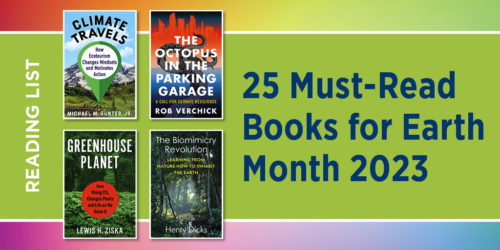Interview with Steven Cohen, Author of Understanding Environmental Policy
“You can’t build a gated community to keep out bad air.”—Steven Cohen
In a recent interview with Columbia University’s School of International and Public Affairs, Steven Cohen discussed the second edition of his book Understanding Environmental Policy.
In the interview, Cohen considers the distinctively interdisciplinary nature of environmental policy and how that is both a positive and a negative:
One of the things that has always struck me about environmental policy is that it’s very interdisciplinary. It incorporates law, politics, environmental science, engineering, and more. At the same time, most of the experts only know one field: economists consider the environmental problem one of market failure and engineers think of environmental protection as an issue related to pollution-control technology. I wanted to develop a framework that explicitly looked at all the factors I considered important to environmental policy—the underlying values, science and technology, economics, public policy and management.
Cohen also offers a fascinating overview of how studying the environment has changed over time and the ways in which Bloomberg’s policies in New York underscored these developments:
The environment as an issue has evolved. In the late 19th and early 20th centuries [in the United States], it was Teddy Roosevelt preserving the west, preserving wild areas, and creating national parks. In the 1960s and ’70s it became an issue of public health. People like Barry Commoner and Rachel Carson talked about the spread of toxics through the ecosphere. By the time I got to the EPA in the late 1970s the health aspects of the environment were starting to dominate. And in the last decade, the field of economic development and the environment seem to have combined; we talk about sustainability and protecting the environment because it’s the source of our [collective] wealth.
You can look at [former New York City mayor] Mike Bloomberg as an illustration of this. He’s didn’t enter office as an environmentalist. But in the middle of his first term, his planners said the city will gain a million people by 2030. He quickly understood the impact of that growth on our quality of life and insightfully asked: How does that kind of growth affect the city’s use of energy and water? How will it affect traffic? So Bloomberg developed PlaNYC 2030 [which took these factors into consideration]. A lot of environmental policy is about preserving scarce resources, and in New York City one of the scarcest resources is surface space on streets south of 59th Street.
The field has really morphed over the years. I use the word environment and sustainability almost interchangeably now. We have to preserve the planet because we’re all biological creatures. You can’t build a gated community to keep out bad air.
The Q&A concludes with Cohen considering how scholars and the academy can and should speak to the broader population. He also considers his own experiences writing for the New York Observer and The Huffington Post:
Peter Kaplan [who edited the Observer for many years and died in November 2013] in a meeting once taught me how to write a column. He called it “writing off of the news.” Just read the newspaper, and ask yourself, “What’s going on that I have something to comment on?” The world is an endless source of inspiration, you just have to run with it….
I try to write on topics people are interested in. Public education is part of the responsibility of the university—there’s a lot of misinformation out there. Part of our job is to educate our students, our field, and the public.






